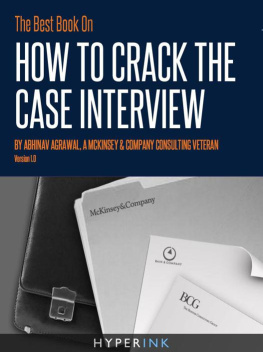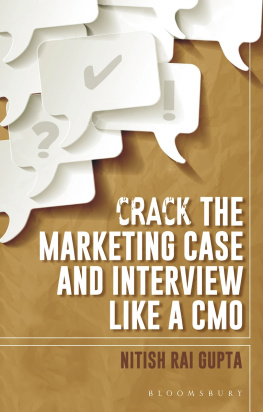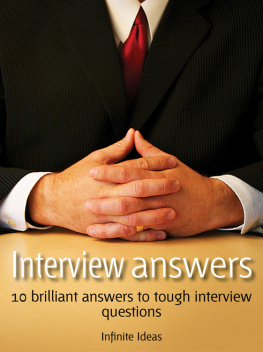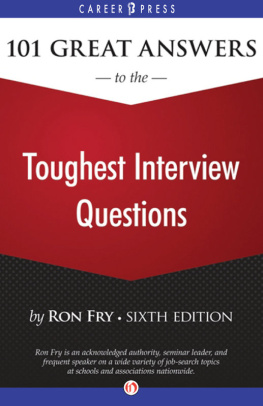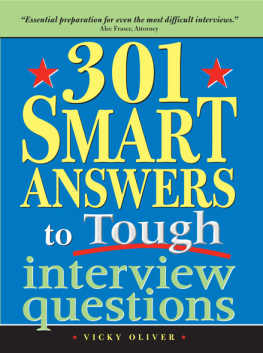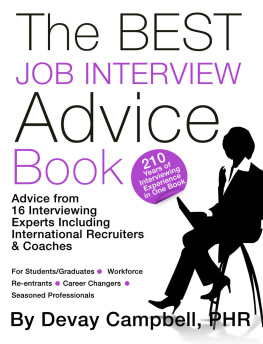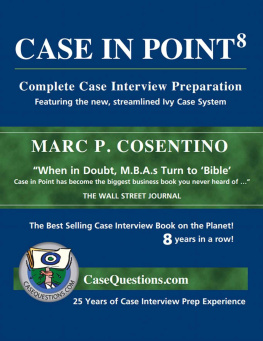Consulting Interview Introduction
Three Must-Know-Strategies For Consultant Interviews
Highlights:
- Read the data thoroughly and take a few minutes to structure your response.
- Be honest. It is actually preferred by the interviewer for you to ask for clarification rather than pretend you fake comprehension.
- Summarize what key points at the end of the interview process.
There are many different roads that have led people to persuing a consultant career. The connecting intersection is that they wanted to be a part of something bigger; something exciting; something that really makes a difference in the world economy. Consulting is the ultimate game of chess; each strategic move shapes not only the way companies interacts with each other, but with the constantly evolving consumer market.
Types of Interviews: Case & Fit
At McKinsey, Bain, BCG, and Booz Allen, there are two different types of interviews; they are called Case and Fit. The case interview is where your understanding of the consulting terminology, economics, and whats happening currently in the world comes into play. This is where youll be judged based on your ability to work through the data given to you by your interviewer and form a logical and analytical solution. Your solution should not only make strategic sense, but it must also fit the overall goals of the hypothesized company.
The Fit interview is very different from the Caseit is more similar to questions you have been asked before in previous job interviews. You will be asked to describe moments in your life that reflect your maturity level, achievements, problem solving, ability to work well with other, as well as give insight to your personality traits.
The Inside Scoop On Consulting Interviews: Three Must-Know Strategies
- Structure your case interviews. The interviewer will tell you to take a few minutes to read through the data theyve given you, organize your thoughts and jot down some quick analytic notes. Actually do this! The time slot they just gave you wasnt a courtesy. The interviewer isnt looking for you to prove how smart you are by not taking the time to organize your thoughts. You should take this time and use it to your benefit so you can give them a well thought out answer to the questions they ask you.
- Be honest. It hurts you more to pretend you dont know something then to just ask the question. In fact, the interviewer will prefer you to verify something you dont understand because it shows that youre not afraid to admit you dont know everything. Its very easy to get caught in a lie, so dont do it. Ask for clarification when you need it and give an honest opinion based on the data in front of you and your own logical thinking.
- Summarize. A big mistake that many candidates make when theyre interviewing for a consultant position is that they forget to, or simple dont see the importance, in summarizing what they just said. Summarization is good for two main reasons. First, it allows you go back over the key points you made and lump them together in one impressive bundle, and second it puts the correct answers you gave at the forefront of the interviewers memory. Everyone makes mistakes, but you want to try to delude your mistakes by focusing on the positive things you did throughout the interview.
Case Interview Layout
There are two main rounds that you will have to get through. Each round is scored separately from the other and does not affect each other in anyway. Each round is a clean slate. Round one is hosted at your university and is generally conducted by associates, senior associates, or junior engagement managers. These are people from the company who are anywhere from 0-3 years out of their MBA.
The second round of interviews is held at the actual consultant firm BCG, Booz Allen, Bain, McKinsey, or another firm youre applying to. It is conducted by the next internal layer of the firm, which is made up of people who have been out of undergraduate school for 3-8 years or longer. Each interview is approximately 30 to 45 minutes long.
Depending on the interview process designed by the firm, you might receive more than one case or fit style interview. Each interview will be scored separately out of a scale between one and five. Typically you will need an average better than 55% to be pushed forward to the next interviewing round.
Below is a table that categorizes the number of interviews, the differences between rounds, interview styles and a rough estimated minimum score you must attain to go on to the next round or to be considered for a entry level position with the interviewing firm.

Both accepted and rejected candidates will be notified by phone rather than through email or letter and will also be given constructive criticism on how each mini-interview they had affected their interview process as a whole. This feedback is crucial, regardless of the result of your interview. If you got rejected this is a chance to receive honest constructive reasoning on what you could of done better.
If you were accepted it is important for you to remember that you still have another round of interviews left this is your chance to really show the firm youre capable of taking criticism gracefully and applying it immediately. This will strengthen you as a professional and help you show your maturity as well as your ability to learn, grow and change positively.
Remember, even if youre upset or disagree with what the feedback youre given, you should realize that this was the impression you left the interviewer. Focus on how you can change that impression in the future and show the qualities that will really leave an impressive lasting impression.
Consultant Interview Breakdown
The interviewing process typically begins with an introduction of the interviewer to the interviewee. The interviewer will share with you some information about their history with the company, why they chose consulting, and why they still enjoy working with their firm today, and perhaps even their own experiences as a candidate interviewing with consulting firms. If youre interviewing at many firms McKinsey, Bain, BCG, Booz Allen, or other companies ask the interviewer why they chose that particular firm.
All of this light-hearted conversation is designed to break the ice and ease away some of your own nervousness. The truth is, the interviewer might be just as nervous to run the interview as you are to answer the questions. The introduction time before the formal interview process gives you both a moment to breath, relax, and focus your energy before the interview starts.
A typical breakdown of what happens in the actual interview can be summed up in the following:
- Greeting and introduction
- A question that pertains to current world economy news
- A hypothetical company related problem based on data the interviewer will provide you
During the time when youre given the data, it will be suggested that you take a few moments to read the data thoroughly, collect your thoughts and formulate a structure that supports your analytical solution to the problem or question asked. It is crucial that you

